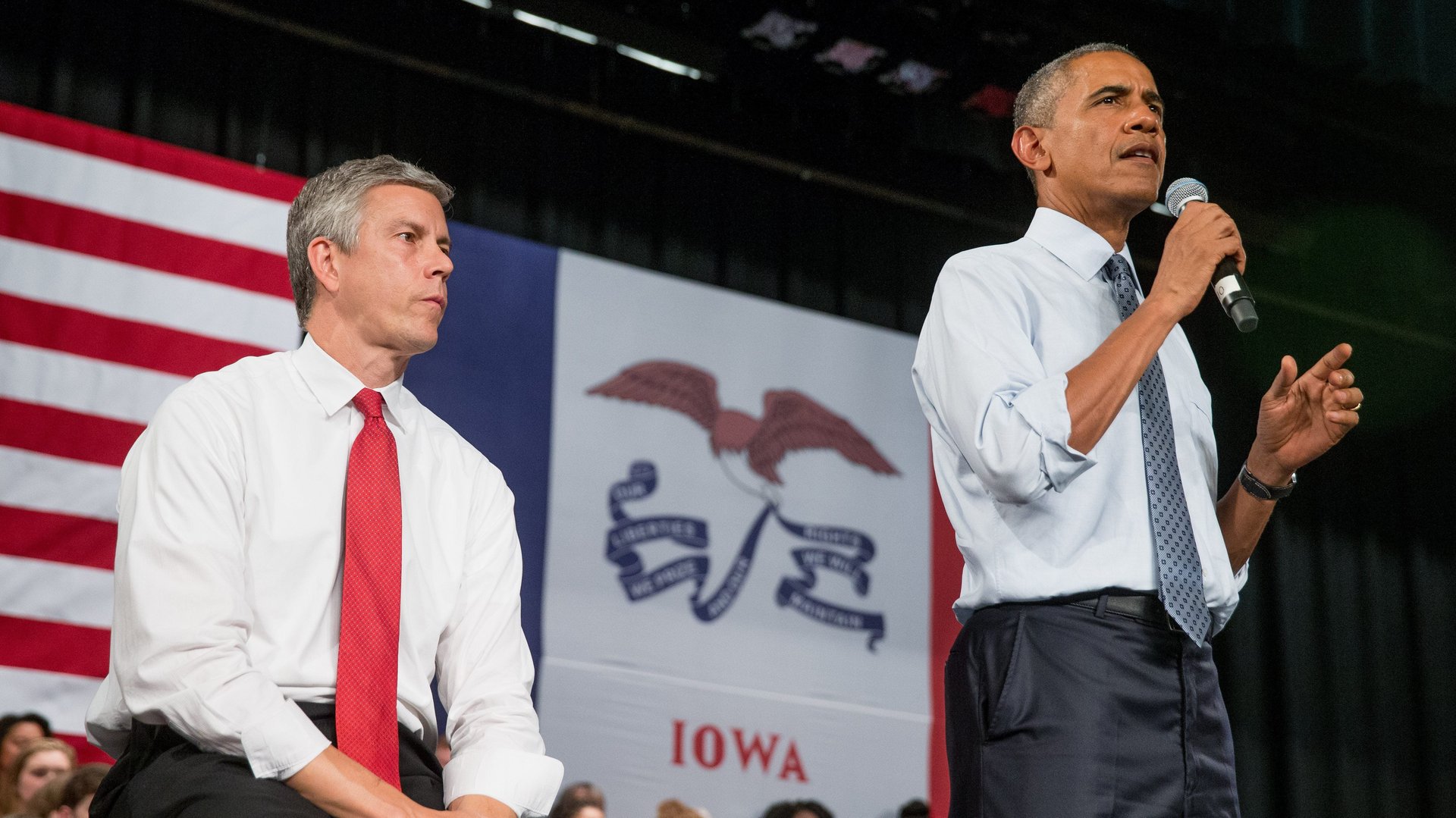What Obama’s secretary of Education tells his kids about Trump: The battle is never over
I ask Arne Duncan a question about the Trump administration’s dismantling of the Obama administration’s education policies, from practices protecting students from predatory lenders to ending protections for transgender students. He said he’d answer, but first he wanted to talk about the Bomb.


I ask Arne Duncan a question about the Trump administration’s dismantling of the Obama administration’s education policies, from practices protecting students from predatory lenders to ending protections for transgender students. He said he’d answer, but first he wanted to talk about the Bomb.
“I wish I had the luxury of just worrying about education policy,” he says. “I am more worried about nuclear war. I’m more worried about other stuff, very honestly, then I am about education policy.”
Duncan, Obama’s first secretary of education, was speaking at a conference for Pluralsight, a Utah-based online education company of which he became a board member last June. He was in Salt Lake City for the company’s announcement that it was joining Pledge 1%, a philanthropic program started by Salesforce founder Marc Benioff to encourage companies to donate 1% of either their time, profit, products, or equity to charitable causes. Pluralsight CEO Aaron Skonnard committed the company to donating 1% in each category.
Duncan spoke to Quartz about the opportunity gap for impoverished people in the US and around the world, explaining that income and opportunity inequality both reinforce the skills gap tech employers are facing today: openings for coders, but no one to fill them. He’s also focused on what he views as the more imminent danger to the future of American democracy and the world—the actions, thus far, of the Trump administration.
“Eighteen months ago, did any of us think we’d be where we are today? No,” he says. “I don’t say this lightly, it’s a scary time. I have young kids, and I hate that they have to live through this. I often think I know where things are going, but I can’t tell how this movie ends.
“We have to do everything we can to get the country to a better place. There are two huge themes in politics; one is hope, and one is fear. Both are extraordinarily powerful; both bring out strong emotions. Clearly with president Obama, hope won. Clearly with president Trump, fear won. I think there are lessons we need to learn from both of those. I know what side of the fence I want to be on, but [Trump] was effective, and we have to acknowledge that.”
When Duncan returns to my question about education policy, his answer is simple: The current administration is focused on undoing progress, and lacks any more comprehensive strategy. He implicitly contrasts this with his time as secretary, which saw national improvements in high school graduation rates, the rates at which graduates are ready for careers, and several other goal-oriented metrics. “What kills me now,” he says, “is there’s no education vision for this country.”
“Right now,” he says, “we have no goals. Just small-ball stuff.” He added that if the Trump administration and secretary of education Betsy DeVos would commit to initiatives like providing universal access to pre-kindergarten, “I’d support it 100%.”
Speaking about what America’s kids need to be better prepared for the rapidly changing world and work environment makes me wonder how he talks to his 15-year-old daughter and 13-year-old son about his successors in Washington.
“We just try and talk very openly and honestly,” he says. “I try and preach less and listen more.
“My hope is that they will never take anything for granted in their life. My hope is that they will never not vote. My hope is that they will be actively civically engaged. I hate that it’s true, but it’s true. There’s no final victories. You think you get health care for everybody and health care might go away. You think you get women to have the right to choose whether they want to have an abortion or not, what they do with their bodies, and that might go away. You think that people have the right to vote and then you have voter suppression.
“For me—not my kids, for me—these have been horribly tough lessons, where I can’t believe we’re still fighting these battles when there are so many other battles. Like, I’d like to spend all our time to focus on how we strengthen the economy. How do we create opportunity, how do we close these gaps? For me, that’s what we should be spending 95% of our time on, but no one’s talking about it, no one’s on that. And so, these are very tough, painful lessons.
“But my hope, and we’ll see, is that they’ll make our kids tougher, smarter, more realistic, and more engaged. Not just my kids, but lots of kids. And if that happens… from something, I don’t want to say evil, but from something really bad, some amazing things can happen.
“There’s no guarantee we’ll get through this, there’s no guarantee something better will come. But I think it can. I think it can. Again, it’s not just my kids, but I think there’s a generation of kids who are engaged and learning and focused and figuring stuff out, that I hope will help us create a more vibrant and more civically engaged democracy. It’s what our country needs, regardless of political lines.”
(Disclosure: Duncan is a managing partner of Emerson Collective, with a focus on improving opportunities for youths in Chicago. In July, Emerson Collective bought a controlling interest in The Atlantic. Atlantic Media, which owns Quartz, is minority/operating owner of the Atlantic.)